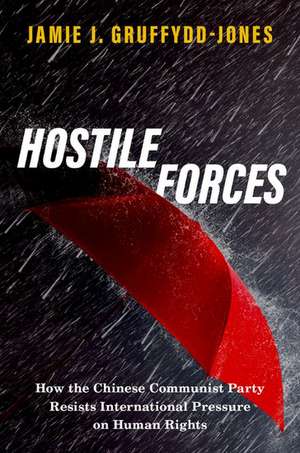Hostile Forces: How the Chinese Communist Party Resists International Pressure on Human Rights
Autor Jamie J. Gruffydd-Jonesen Limba Engleză Hardback – 9 mar 2023
| Toate formatele și edițiile | Preț | Express |
|---|---|---|
| Paperback (1) | 164.68 lei 10-16 zile | +41.42 lei 4-10 zile |
| Oxford University Press – 13 oct 2022 | 164.68 lei 10-16 zile | +41.42 lei 4-10 zile |
| Hardback (1) | 470.16 lei 3-5 săpt. | +20.77 lei 4-10 zile |
| Oxford University Press – 9 mar 2023 | 470.16 lei 3-5 săpt. | +20.77 lei 4-10 zile |
Preț: 470.16 lei
Preț vechi: 553.13 lei
-15% Nou
Puncte Express: 705
Preț estimativ în valută:
89.99€ • 97.79$ • 75.64£
89.99€ • 97.79$ • 75.64£
Carte disponibilă
Livrare economică 31 martie-14 aprilie
Livrare express 14-20 martie pentru 30.76 lei
Preluare comenzi: 021 569.72.76
Specificații
ISBN-13: 9780197643198
ISBN-10: 0197643191
Pagini: 260
Ilustrații: 24
Dimensiuni: 156 x 235 x 18 mm
Greutate: 0.5 kg
Editura: Oxford University Press
Colecția OUP USA
Locul publicării:New York, United States
ISBN-10: 0197643191
Pagini: 260
Ilustrații: 24
Dimensiuni: 156 x 235 x 18 mm
Greutate: 0.5 kg
Editura: Oxford University Press
Colecția OUP USA
Locul publicării:New York, United States
Recenzii
In this provocative new study, Jamie Gruffydd-Jones argues that international criticism of human rights violations by the Chinese government have not worked and are unlikely to without a fundamental change of strategy. Everyone interested in the promotion of human rights, in China or elsewhere, needs to read this book and heed its advice.
This study offers a rich and important analysis of why international human rights campaigns that target major authoritarian regimes, like China, have yielded little success. Gruffydd-Jones demonstrates how these campaigns are selectively co-opted by Chinese authorities for propaganda purposes, and how they are often treated with suspicion by the public, especially when the critiques are communicated by China's main rival-the United States. This book is a timely reminder that great power rivalry can overshadow transnational human rights advocacy, and that authoritarian regimes are increasingly adept at diverting international condemnation into a powerful nationalistic sentiment.
Democracies routinely criticize the human rights practices of autocracies. Is this criticism effective? This important book that should be widely read by policymakers documents that when the US criticizes China alone, Chinese citizens tend to rally around the government. In contrast, multilateral criticism is much more effective in shaping public opinion in China.
Jamie Gruffydd-Jones has written an important book examining the Chinese Communist Party's response to criticism on human rights. He explains why, when, and how Beijing permits human rights messages to pierce China's information bubble. His theoretical framework and case studies yield insights into which types of foreign critiques are most likely to trigger reforms and which are more likely to backfire, being used for propaganda purposes by China and other autocratic regimes.
A fascinating read.
In a context of growing criticism of China's human rights violations, Jamie Gruffydd-Jones makes a valuable contribution in analysing the backlash and unintended consequences that this criticism might prompt as well as its impact on Chinese citizens.
Hostile Forces is a fascinating book that will appeal to two crowds: China scholars and human rights advocates. Gruffydd-Jones makes a contribution by describing the dilemma of human rights pressure having unintended effects on citizen attitudes.
This study offers a rich and important analysis of why international human rights campaigns that target major authoritarian regimes, like China, have yielded little success. Gruffydd-Jones demonstrates how these campaigns are selectively co-opted by Chinese authorities for propaganda purposes, and how they are often treated with suspicion by the public, especially when the critiques are communicated by China's main rival-the United States. This book is a timely reminder that great power rivalry can overshadow transnational human rights advocacy, and that authoritarian regimes are increasingly adept at diverting international condemnation into a powerful nationalistic sentiment.
Democracies routinely criticize the human rights practices of autocracies. Is this criticism effective? This important book that should be widely read by policymakers documents that when the US criticizes China alone, Chinese citizens tend to rally around the government. In contrast, multilateral criticism is much more effective in shaping public opinion in China.
Jamie Gruffydd-Jones has written an important book examining the Chinese Communist Party's response to criticism on human rights. He explains why, when, and how Beijing permits human rights messages to pierce China's information bubble. His theoretical framework and case studies yield insights into which types of foreign critiques are most likely to trigger reforms and which are more likely to backfire, being used for propaganda purposes by China and other autocratic regimes.
A fascinating read.
In a context of growing criticism of China's human rights violations, Jamie Gruffydd-Jones makes a valuable contribution in analysing the backlash and unintended consequences that this criticism might prompt as well as its impact on Chinese citizens.
Hostile Forces is a fascinating book that will appeal to two crowds: China scholars and human rights advocates. Gruffydd-Jones makes a contribution by describing the dilemma of human rights pressure having unintended effects on citizen attitudes.
Notă biografică
Jamie Gruffydd-Jones is a Lecturer (Assistant Professor) in the University of Kent. He received a Doctorate from Princeton University, as well as Masters' and Bachelors' degrees from the University of Oxford. He researches authoritarian politics and nationalism, focussing on China. This research explores how international efforts to change a regime's behaviour influence domestic politics and public opinion, and the causes and consequences of rises in authoritarian and nationalist sentiment. Some of his work has been published in Comparative Political Studies, International Studies Quarterly, Democratization, and Security Studies Journal. He teaches courses on East Asian politics and international relations.
